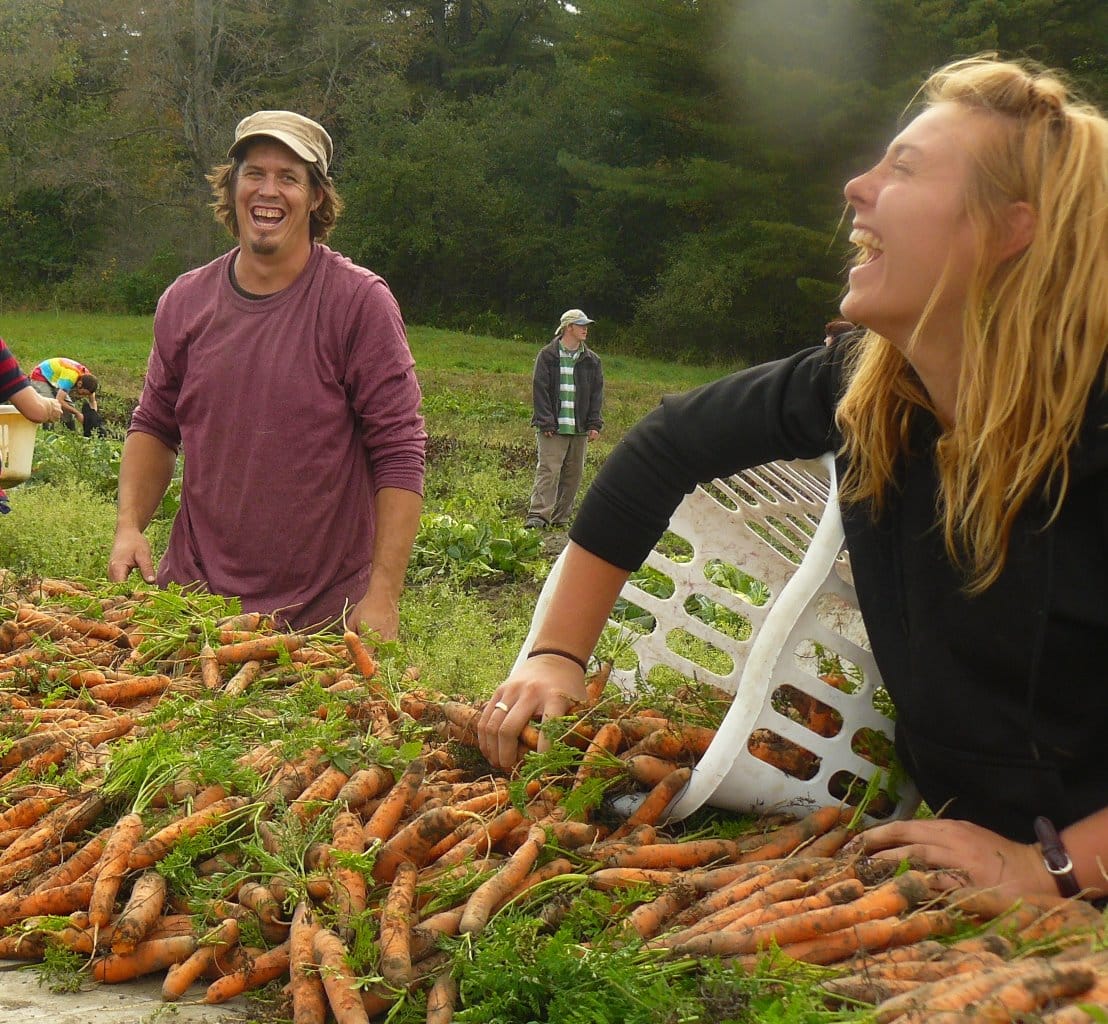Connor is up at 5:30 am. He pulls on his colorful, hand-knitted stocking cap, insulated coveralls, barn boots and wool mittens before stepping out into the northern Vermont winter air. In the barn, four Jersey/Brown Swiss cows are lined up in the milking parlor stalls. Connor brushes the cows, then pulls up a wooden milking stool. He washes Amber’s udder, and begins milking by hand. Rhythmic streams of warm milk slowly fill the stainless steel pail. Steam mixes with the cows’ sweet breath and rises like smoke into the frigid air. The sun is just rising over the mountain as chores are ending. Connor walks back to his house, full milk can in hand. Rachel, a one-year volunteer from Pennsylvania, greets Connor as he arrives home, and they sit down to breakfast — Heartbeet-grown bacon and eggs, homemade granola with berries and farm fresh milk.
Heartbeet Lifesharing is a licensed Therapeutic Community Residence. Founded by Hannah Schwartz and Jonathan Gilbert in 2000, Heartbeet promotes equality and understanding through meaningful work, and respectful, caring relationships. Fifteen adults with special needs (known as “Friends” within the Heartbeet community) live permanently in four extended family homes situated on a one hundred fifty acre bio dynamic farm in Vermont’s Northeast Kingdom. Friends live with householding families, American and international volunteers. Everyone shares in the activities of home, farm, and the arts, as part of carefully orchestrated “crews.” Fencing, haying and cultivating the two-acre vegetable garden are among the summer tasks. Autumn brings the harvest, firewood, and preserving food for winter. Daily farm chores include milking the cows and caring for pigs, chickens, goats and dogs. Artistic studios include wool felting, fiber arts, paper making and woodworking. Housekeeping chores and meal preparation also provide meaningful work and camaraderie. As a community of mixed abilities, each member contributes to home life, farm life and community life — sharing time together, growing food together, creating culture and a true sense of belonging.
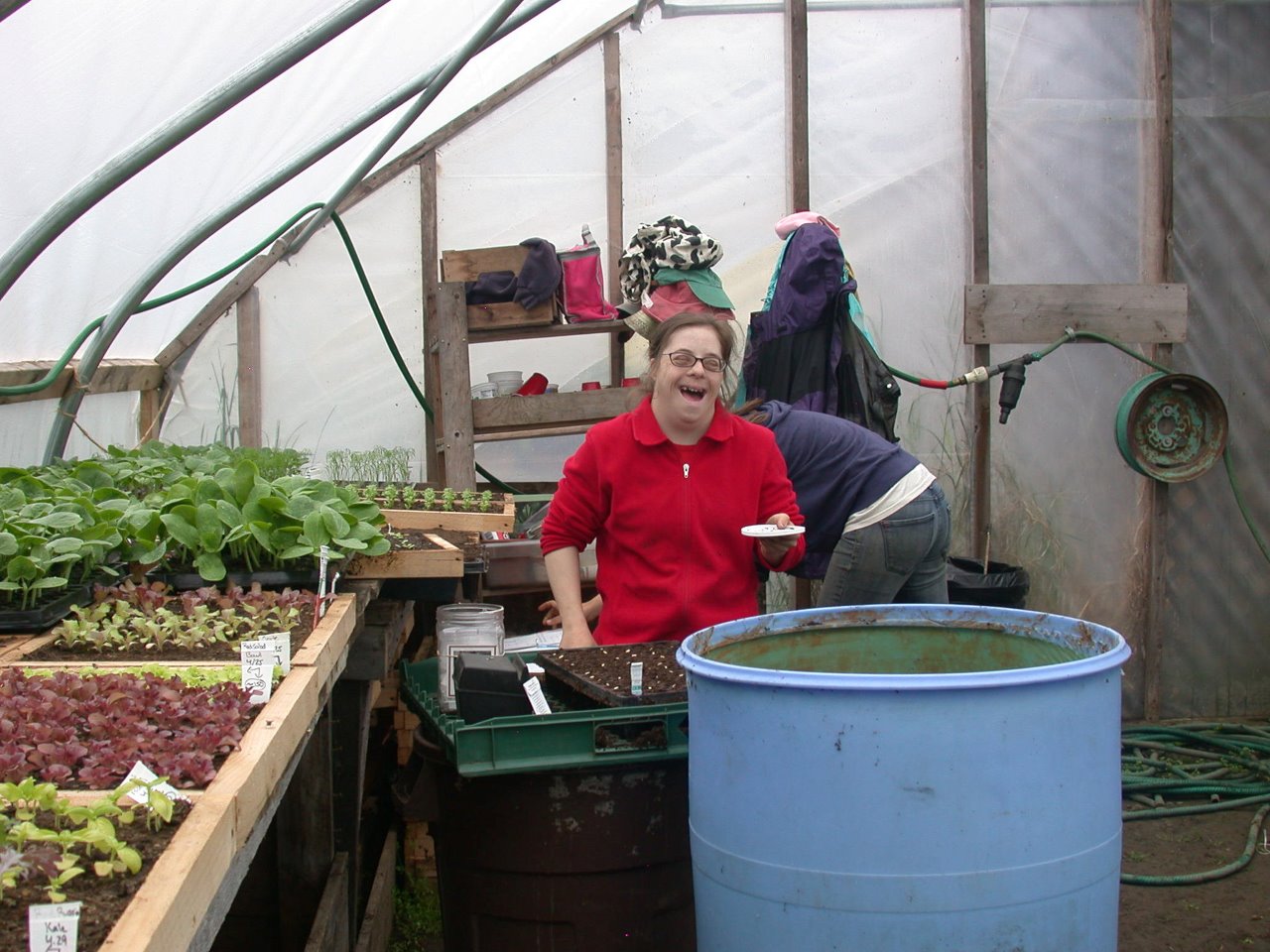
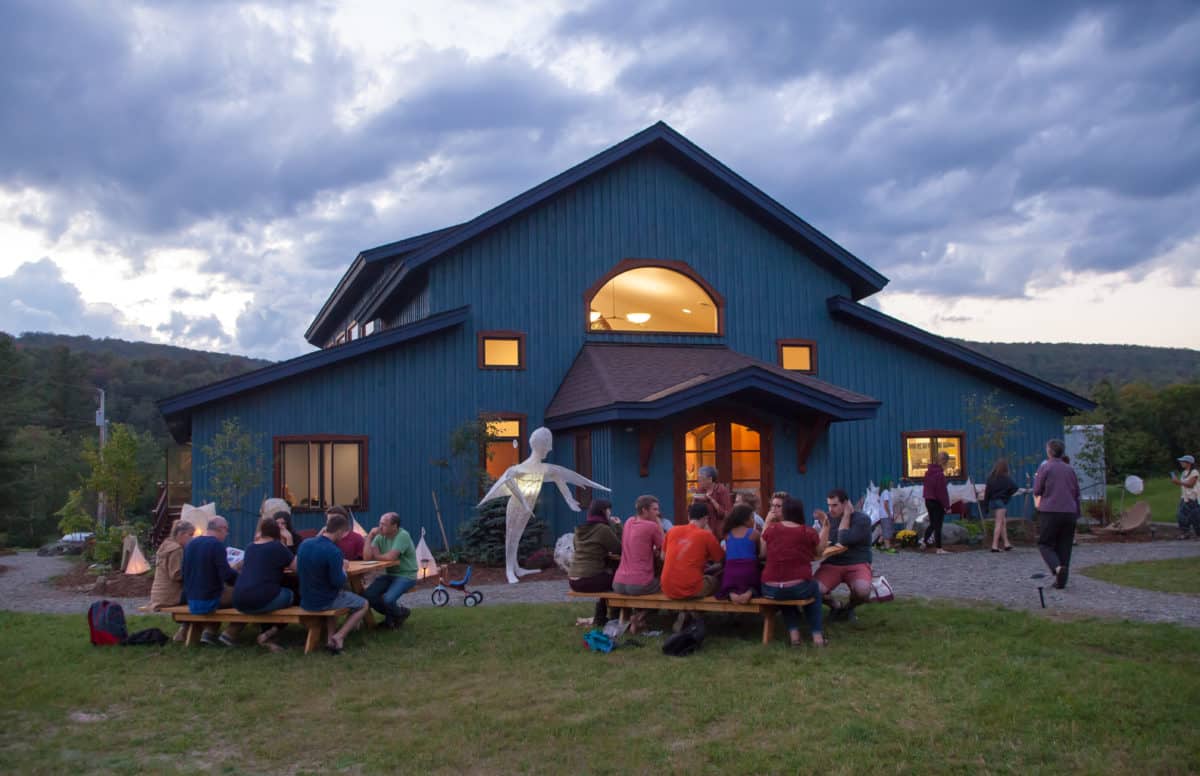
Heartbeet values each individual, and helps them develop and pursue their interests.
Heartbeet produces about sixty percent of its own food, including beef cattle, pigs and chickens, eggs, and a robust selection of dairy products. Working with the dairy crew, cheese maker Dan Morse oversees production of butter, yogurt, kefir, and a variety of fresh and aged cheeses.
Vegetable production begins as early as possible in the northern Vermont climate. Seedlings are planted in the wood-heated greenhouse in February, and cultivation of the two-acre vegetable garden continues into October. Delicious, fresh vegetables are delivered regularly to each life sharing home.
By mid-summer, the preserving kettles are boiling and food processors whirring as farm and garden crews turn their energies to putting food by for winter. Freezers are full of garden vegetables to be used in soups and as meal accompaniments. Gallons of pesto, strawberries and blueberries are enjoyed all winter long. The pantry is lined with jars of sweet and dill pickles, and crocks of sauerkraut and kimchi.
Healthy food and lifestyle are strongly held Heartbeet values. Annie, who has Down syndrome, arrived from Connecticut and she did not like to get dirty. At Heartbeet, she found she had a green thumb and is now one of the main gardeners. She appreciates the connection between her garden work and the food she eats. Nutritious, homegrown food has helped Annie shed one hundred pounds and become interested in health and nutrition.
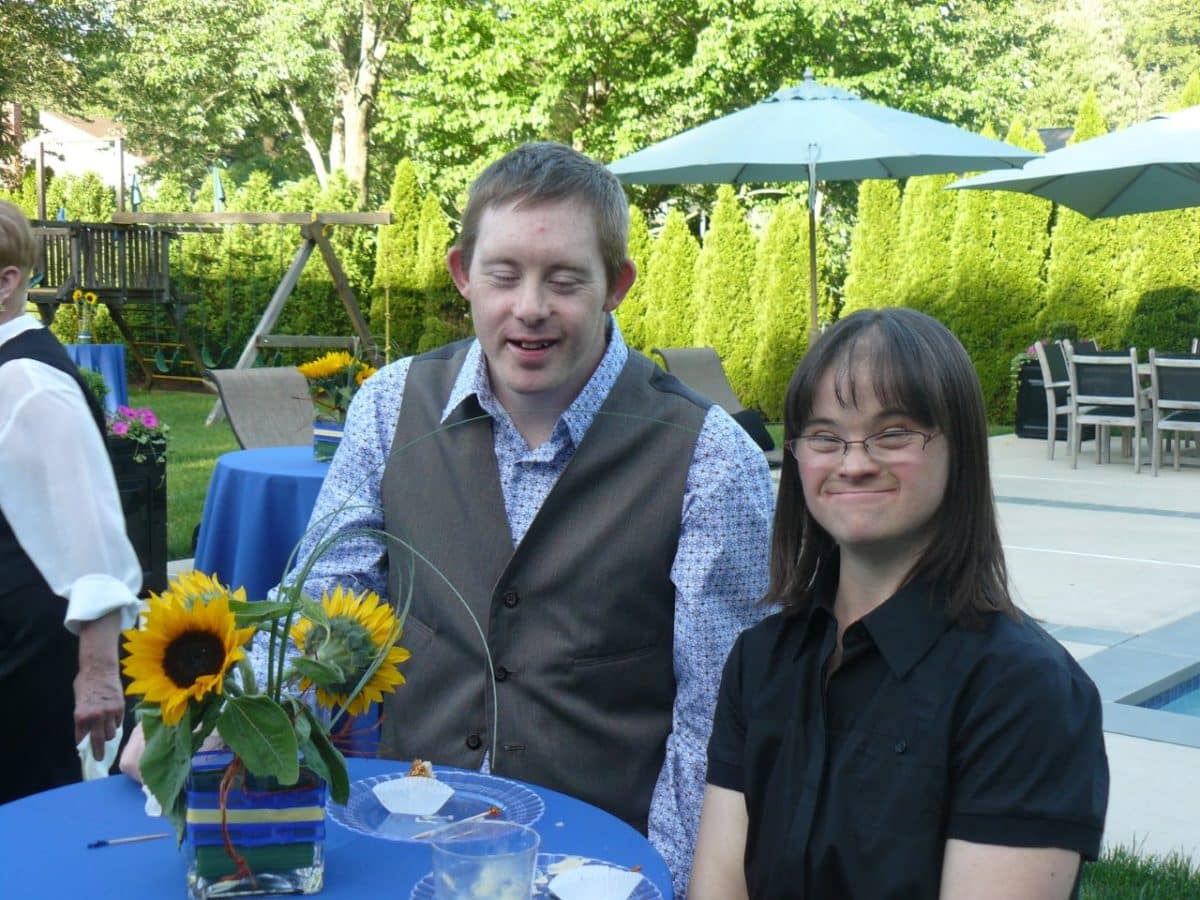
Heartbeet is one of eleven Camphill communities in North America, and more than one hundred worldwide. Along with Waldorf education and biodynamic agriculture, Camphill communities are based on the philosophy of Ruldolf Steiner. Steiner’s teachings impart a deep respect for all human beings. Heartbeet values each individual, and helps them develop and pursue their interests. Kei has weekly drum lessons; Sequoya recently attended a Vermont Rail Action Network meeting; Annie and Chris were engaged in May, and have been supported throughout their relationship.
Heartbeet is growing. The fourth life sharing home was completed in 2013, and two more homes and a Community Center are planned over the next several years. Ultimately, the community will accommodate thirty adults with special needs.
At this point in Heartbeet’s planned development, a larger space is needed to comfortably bring everyone together under one roof, and to invite the local community in. Heartbeet is accepting donations for a capital campaign to build a Community Center, which will answer the need for more space, and enrich lives at Heartbeet and beyond.
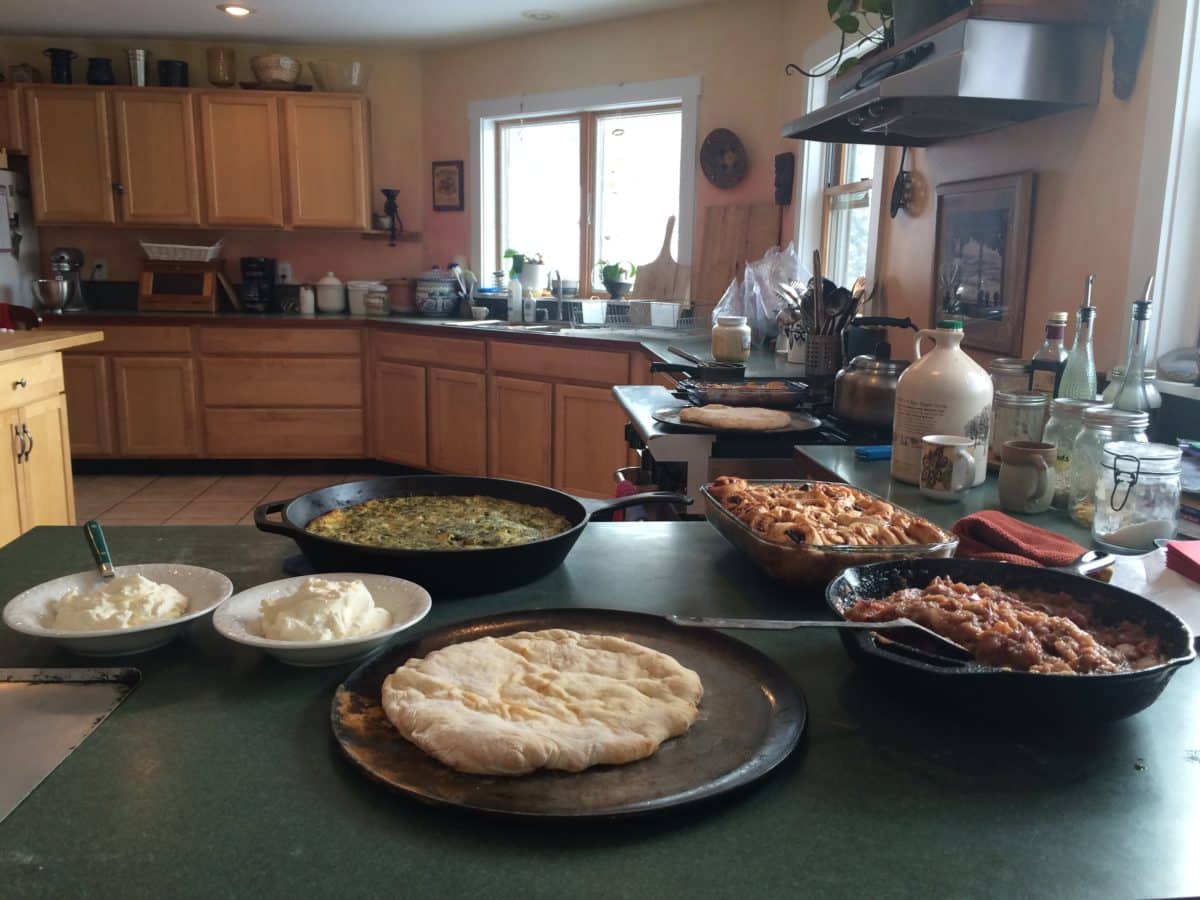
This building will be the center of activities. It will include a classroom, therapy/fitness room, library, dining area and much-needed community kitchen. The spacious, new kitchen will allow Heartbeet to increase food preservation and value-added dairy production, as well as include more Friends in these skill building activities. The kitchen will also enable the Heartbeet community to come together for meals, and to invite the local community to eat. Weekly community dinners, free and open to the public, will provide opportunities to share Heartbeet’s bounty, good cooking, and good company.
An auditorium with a stage will accommodate festivals and plays, and provide a venue for music and theater events reaching out into the larger community. A main objective for the Community Center is to bring people of mixed abilities together, providing opportunities for friendship. Personal relationships build acceptance and real inclusion, creating a better world for everyone.
Dinner marks the close of the day at Heartbeet. In each house, everyone gathers around a large dining room table. A candle is lit, the meal is blessed and served, and it is time to process the day and look to tomorrow, in warmth and conversation.
Heartbeet is one of eleven Camphill communities in North America, and more than one hundred worldwide. Along with Waldorf education and biodynamic agriculture, Camphill communities are based on the philosophy of Ruldolf Steiner. Steiner’s teachings impart a deep respect for all human beings. Heartbeet values each individual, and helps them develop and pursue their interests. Kei has weekly drum lessons; Sequoya recently attended a Vermont Rail Action Network meeting; Annie and Chris were engaged in May, and have been supported throughout their relationship.
Update: This article was originally published in February of 2015. Since then, Annie and Chris were joined in a beautiful commitment ceremony, and have moved to an apartment in one of Heartbeet’s lifesharing homes.
The Community Center was completed a year ago, and is the heart of Heartbeet. Since opening the Center last October, Heartbeet has welcomed visitors from around the world to a variety of always-inclusive events, including the world-renowned Bread and Puppet Theater, classical music ensembles, world music choral concerts, a Shakespeare summer camp for teens, Heartbeet-grown meals, and more, bringing together people of all abilities in this beautiful, new space.
For more information, to make a donation or to learn about gap year and other volunteer opportunities, visit www.heartbeet.org or contact info@heartbeet.org ![]()
